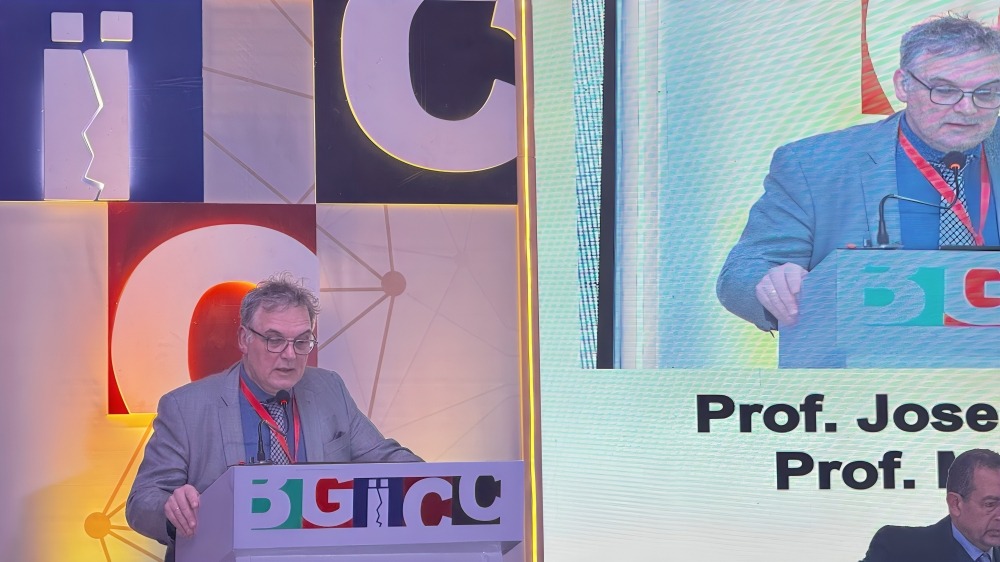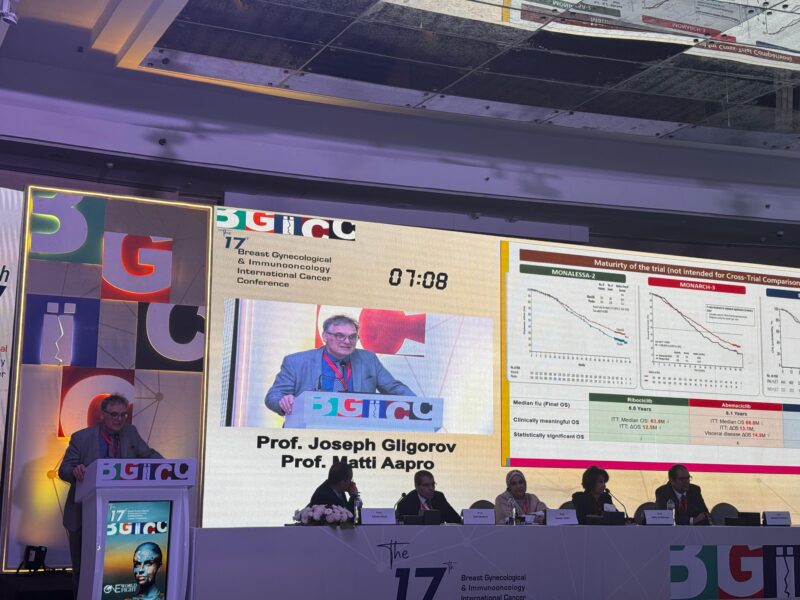
Prof. Joseph Gligorov at BGICC 2025: Should All HR+/HER2- Metastatic Breast Cancer Patients Receive CDK4/6 Inhibitors in the First Line?
During the 17th BGICC conference, Prof. Joseph Gligorov addressed one of the most pressing questions in oncology: Should all HR+/HER2- metastatic breast cancer (MBC) patients be treated with CDK4/6 inhibitors (CDK4/6i) as a first-line therapy?
Prof. Gligorov passionately advocated for a universal approach, presenting robust evidence to support his stance.
Key Arguments Supporting Universal CDK4/6i Use
1. Progression-Free Survival (PFS):
CDK4/6 inhibitors, in combination with endocrine therapy, have shown consistent and significant improvements in PFS across multiple landmark trials. Many patients achieve PFS exceeding 50 months, highlighting the efficacy of this approach.
2. Overall Survival (OS) Improvements:
Trials such as MONALEESA-2, PALOMA-3, and MONARCH-3 have demonstrated meaningful OS benefits with CDK4/6 inhibitors in the first-line setting, redefining outcomes for HR+/HER2- MBC patients.
3. Safety and Tolerability:
Prof. Gligorov emphasized the favorable safety profile of CDK4/6 inhibitors compared to traditional chemotherapy. Adverse effects are generally manageable, making this therapy more tolerable while maintaining quality of life.
4. Efficacy Across Patient Subgroups:
Evidence suggests that CDK4/6 inhibitors are equally effective in premenopausal and postmenopausal women, as well as in those with visceral disease. This broad efficacy underscores their suitability as a first-line treatment for all HR+/HER2- MBC patients.
5. Delaying Chemotherapy:
By extending progression-free intervals, CDK4/6 inhibitors delay the need for more toxic chemotherapy regimens, preserving patient well-being and delaying treatment-related side effects.
Challenges and Counterpoints
While the case for CDK4/6 inhibitors is compelling, Prof. Gligorov acknowledged some challenges:
- Cost:
The high cost of CDK4/6 inhibitors presents a barrier, particularly in resource-limited settings, highlighting the need for strategies to improve affordability and access.
- Patient Selection:
Although current evidence supports universal use, certain subgroups may benefit more than others. Until reliable biomarkers are identified, Prof. Gligorov maintains that CDK4/6 inhibitors should remain the standard for all eligible patients.
Conclusion
In his closing remarks, Prof. Gligorov firmly endorsed CDK4/6 inhibitors as the cornerstone of first-line therapy for HR+/HER2- MBC patients:
“CDK4/6 inhibitors have transformed the treatment landscape. The evidence is clear—there is no reason to withhold these agents from any eligible patient. Universal access to this therapy is vital for achieving the best possible outcomes.”
This session at BGICS reinforced the need for global efforts to address access challenges and ensure that all HR+/HER2- MBC patients can benefit from these groundbreaking therapies.

Further Reading:
BGICC 2025: Hear from Global Oncology Leaders
Introducing the Radiology Course at BGICC 2025
Get Ready for BGICC 2025: A Global Event in Cancer Care
The 17th Annual BGICC Conference Kicks Off in Cairo, Egypt with 5,000 Attendees
Scientific Insights from Prof. Hope Rugo: Advancements in Metastatic HER2+ Breast Cancer Therapy
-
ESMO 2024 Congress
September 13-17, 2024
-
ASCO Annual Meeting
May 30 - June 4, 2024
-
Yvonne Award 2024
May 31, 2024
-
OncoThon 2024, Online
Feb. 15, 2024
-
Global Summit on War & Cancer 2023, Online
Dec. 14-16, 2023
